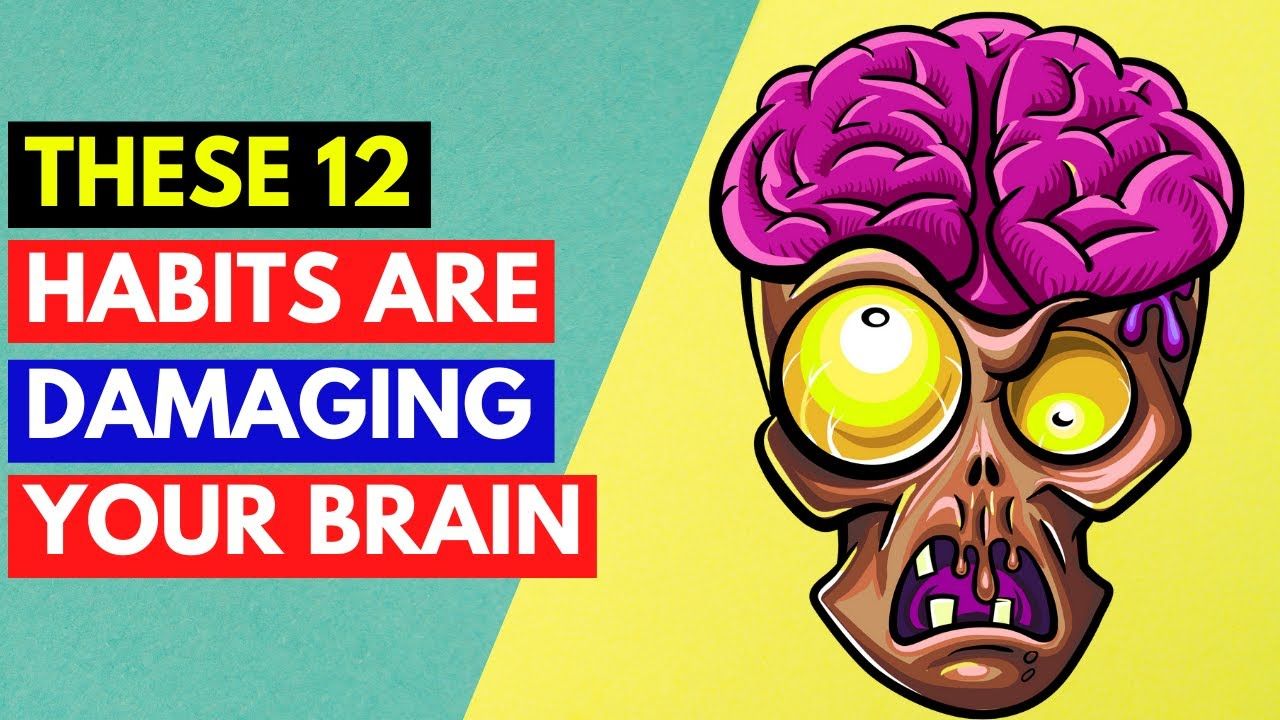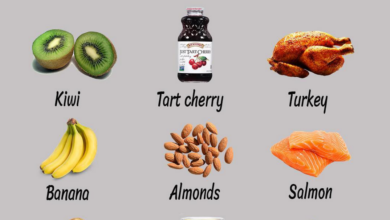
An Unhealthy Diet Could Hurt Your Brain: Fueling Your Mind
An unhealthy diet could hurt your brain, and it’s not just a figure of speech. The food we eat directly impacts the health and function of our brains, which control everything from our thoughts and emotions to our memories and motor skills.
It’s a fascinating connection, and understanding it can help us make better choices for a healthier and sharper mind.
From the essential nutrients that fuel cognitive processes to the inflammatory responses triggered by unhealthy foods, our diet plays a crucial role in maintaining brain health. Think of your brain as a powerful engine that requires the right fuel to run smoothly.
Just like a car needs high-quality gasoline, our brains need a balanced and nutrient-rich diet to function at their best.
The Impact of Diet on Brain Health: An Unhealthy Diet Could Hurt Your Brain

Your brain, the control center of your body, relies heavily on the nutrients you provide through your diet. Just as a car needs fuel to run, your brain needs a steady supply of essential nutrients to function optimally. This intricate relationship between diet and brain health is a fundamental aspect of maintaining cognitive well-being.
The Role of Essential Nutrients in Supporting Cognitive Processes
Your brain is a complex organ that requires a variety of nutrients to perform its vital functions, including learning, memory, mood regulation, and overall cognitive health. These nutrients act as building blocks and fuel for brain cells, supporting various cognitive processes.
Here are some key nutrients that play a crucial role in brain health:
- Omega-3 Fatty Acids:These essential fats are crucial for brain cell structure and function. They contribute to the formation of myelin, a protective sheath that insulates nerve fibers, enabling efficient communication between brain cells. Omega-3s are also involved in reducing inflammation and supporting cognitive function.
- B Vitamins:This group of vitamins, particularly B12, B6, and folate, are essential for the production of neurotransmitters, chemical messengers that facilitate communication between brain cells. They also play a role in DNA synthesis and cell metabolism, which are crucial for brain cell health and function.
- Antioxidants:Antioxidants protect brain cells from damage caused by free radicals, unstable molecules that can contribute to oxidative stress and aging. Vitamin C, vitamin E, and selenium are examples of powerful antioxidants that can help safeguard brain health.
- Iron:This mineral is essential for oxygen transport throughout the body, including the brain. Iron deficiency can lead to reduced cognitive function and fatigue.
- Zinc:Zinc is involved in various brain functions, including learning, memory, and mood regulation. It is also important for the production of neurotransmitters and the development of brain cells.
Nutrient Deficiencies and Their Impact on Brain Health
A lack of essential nutrients can have detrimental effects on brain health, leading to a range of cognitive problems. These deficiencies can disrupt various brain functions, impacting mood, memory, concentration, and overall cognitive performance. Here are some examples of how nutrient deficiencies can negatively impact brain health:
- Iron Deficiency (Anemia):Iron deficiency can lead to reduced oxygen delivery to the brain, resulting in fatigue, difficulty concentrating, and impaired cognitive function.
- Vitamin B12 Deficiency:This deficiency can impair the production of myelin, leading to nerve damage and cognitive decline. Symptoms can include memory problems, confusion, and difficulty walking.
- Omega-3 Fatty Acid Deficiency:A lack of omega-3s can contribute to cognitive decline, mood disorders, and increased risk of neurodegenerative diseases.
Specific Dietary Habits and Brain Health
The food we consume has a profound impact on our brain health, influencing everything from cognitive function to mood and even our risk for neurodegenerative diseases. Understanding the specific dietary habits that can negatively affect brain health is crucial for making informed choices that support optimal brain function.
Excessive Sugar Consumption and Brain Function
Excessive sugar consumption can have detrimental effects on brain health, leading to impaired cognitive function and an increased risk of chronic diseases.
- Insulin Resistance:High sugar intake can lead to insulin resistance, a condition where the body’s cells become less responsive to insulin, a hormone that regulates blood sugar levels. This can disrupt the delicate balance of glucose metabolism in the brain, impairing cognitive function and increasing the risk of neurodegenerative diseases like Alzheimer’s disease.
- Inflammation:Sugar consumption can trigger inflammation in the brain, which can damage brain cells and contribute to cognitive decline. Studies have shown that high sugar intake is associated with increased levels of inflammatory markers in the brain, leading to impaired memory and learning.
It’s crazy to think that what we eat can actually affect our brains, but it’s true! An unhealthy diet can lead to inflammation and even damage brain cells, which can impact our memory and thinking skills. So, while workout music says to push ourselves, we also need to make sure we’re fueling our bodies with the right nutrients to support our mental health.
It’s all about balance, right?
- Addiction:Sugar can trigger the release of dopamine, a neurotransmitter associated with pleasure and reward, in the brain. This can lead to sugar cravings and an addictive cycle, making it difficult to control sugar intake.
The Effects of Saturated and Trans Fats on Cognitive Health
A diet high in saturated and trans fats can have a negative impact on cognitive health, increasing the risk of cardiovascular disease and contributing to cognitive decline.
- Cardiovascular Disease:Saturated and trans fats raise LDL (“bad”) cholesterol levels, which can contribute to the buildup of plaque in the arteries, increasing the risk of heart disease and stroke. These conditions can impair blood flow to the brain, leading to cognitive decline and an increased risk of dementia.
- Inflammation:Saturated and trans fats can trigger inflammation in the brain, similar to the effects of excessive sugar intake. This inflammation can damage brain cells and contribute to cognitive decline.
- Brain Cell Function:Saturated and trans fats can interfere with the proper functioning of brain cells, disrupting communication between neurons and impairing cognitive function. Research suggests that a high intake of saturated and trans fats can lead to reduced brain volume and impaired memory.
Processed Foods and Brain Inflammation, An unhealthy diet could hurt your brain
Processed foods are often high in unhealthy fats, sugar, and sodium, and they can contribute to brain inflammation, which can negatively impact cognitive function.
- Inflammation:Processed foods are often high in inflammatory compounds, such as omega-6 fatty acids and trans fats, which can trigger inflammation in the brain. This inflammation can damage brain cells, impair cognitive function, and increase the risk of neurodegenerative diseases.
- Gut Health:Processed foods can disrupt the balance of bacteria in the gut, known as the gut microbiome. An unhealthy gut microbiome can contribute to inflammation throughout the body, including the brain, leading to cognitive decline.
- Nutrient Deficiencies:Processed foods are often low in essential nutrients, such as vitamins, minerals, and antioxidants. These nutrient deficiencies can contribute to brain inflammation and impair cognitive function.
The Role of Inflammation in Brain Health
Inflammation is a natural process that helps the body heal from injury or infection. However, chronic inflammation, which persists for long periods, can have damaging effects on various organs, including the brain. In the brain, inflammation can disrupt the delicate balance of cells and processes that are essential for optimal cognitive function.
Chronic Inflammation and Brain Cell Damage
Chronic inflammation in the brain can lead to the destruction of brain cells, known as neurons. When the immune system is activated in response to a perceived threat, it releases inflammatory chemicals called cytokines. While these chemicals are necessary for short-term immune responses, prolonged exposure to high levels of cytokines can damage neurons and disrupt their communication pathways.
We all know that an unhealthy diet can lead to weight gain and other health problems, but did you know it can also negatively impact your brain? It’s true! To help you stay healthy and energized, try incorporating a quick and effective workout routine like your 9 minute total body bodyweight workout.
By fueling your body with healthy foods and keeping your mind and body active, you’ll be on the right track to a healthier, happier you.
This damage can contribute to cognitive decline and neurodegenerative diseases.
Dietary Factors Contributing to Chronic Inflammation in the Brain
- High intake of saturated and trans fats:These fats, often found in processed foods and animal products, can increase inflammation in the body, including the brain.
- High intake of refined carbohydrates:Sugary drinks, white bread, and other refined carbohydrates can spike blood sugar levels, leading to insulin resistance and increased inflammation.
- Low intake of fruits and vegetables:Fruits and vegetables are rich in antioxidants and anti-inflammatory compounds that can help protect the brain from damage.
- Excessive alcohol consumption:Alcohol can contribute to inflammation in the brain and increase the risk of neurodegenerative diseases.
Inflammation and Neurodegenerative Diseases
Chronic inflammation plays a significant role in the development and progression of neurodegenerative diseases such as Alzheimer’s disease, Parkinson’s disease, and multiple sclerosis. These diseases are characterized by the loss of brain cells and the formation of amyloid plaques and tau tangles, which contribute to cognitive decline.
Research suggests that inflammation may be a key factor in the formation of these harmful structures. For example, in Alzheimer’s disease, the amyloid plaques, which are clumps of protein fragments, are thought to trigger inflammation in the brain, leading to further neuron damage and cognitive impairment.
The Importance of a Balanced Diet for Brain Health
A balanced diet is crucial for maintaining optimal brain function. It provides the essential nutrients your brain needs to thrive, including vitamins, minerals, and antioxidants. Consuming a variety of nutrient-rich foods can help protect your brain against age-related decline, enhance cognitive function, and reduce the risk of neurological disorders.
A Sample Meal Plan for Optimal Brain Function
A balanced meal plan for optimal brain function should include a variety of food groups, such as fruits, vegetables, whole grains, lean protein, and healthy fats. Here is a sample meal plan that incorporates these essential nutrients:
Breakfast
- Oatmeal with berries and nuts
- Greek yogurt with fruit and granola
- Eggs with whole-wheat toast and avocado
Lunch
- Salad with grilled chicken or fish, quinoa, and a variety of vegetables
- Whole-wheat sandwich with lean protein, vegetables, and a light spread
- Lentil soup with whole-wheat bread
Dinner
- Salmon with roasted vegetables and brown rice
- Chicken stir-fry with tofu and brown rice
- Vegetarian chili with whole-wheat cornbread
Snacks
- Fruits and vegetables
- Nuts and seeds
- Yogurt
- Trail mix
The Benefits of Various Food Groups for Brain Health
| Food Group | Benefits for Brain Health |
|---|---|
| Fruits and Vegetables | Rich in antioxidants, vitamins, and minerals that protect brain cells from damage and inflammation. |
| Whole Grains | Provide complex carbohydrates that fuel brain function and support memory. |
| Lean Protein | Essential for building and repairing brain cells. |
| Healthy Fats | Support brain cell growth and function. |
| Dairy | Provides calcium and vitamin D, which are important for bone health and may play a role in cognitive function. |
Brain-Boosting Foods and Their Nutrients
Here is a list of brain-boosting foods and their respective nutrients:* Blueberries:Rich in antioxidants, which protect brain cells from damage.
Avocados Contain monounsaturated fats, which support brain cell growth and function.
Salmon Provides omega-3 fatty acids, which are essential for brain health.
Walnuts A good source of omega-3 fatty acids, antioxidants, and vitamin E.
Dark chocolate Contains flavonoids, which may improve cognitive function and memory.
Eggs A source of choline, which is important for memory and learning.
Green leafy vegetables Rich in folate, which is essential for brain cell growth and development.
It’s easy to fall into unhealthy eating habits, especially with the constant bombardment of tempting treats. But remember, what you eat directly affects your brain health. To avoid the negative impacts, it’s crucial to practice strategies for eating in moderation , like mindful eating and portion control.
By making conscious choices about what and how much you eat, you can nourish your mind and body for optimal brain function.
Turmeric Contains curcumin, a powerful anti-inflammatory compound that may protect the brain from damage.
Coffee Contains caffeine, which can improve alertness and cognitive function.
Tea Contains antioxidants and polyphenols, which may protect the brain from damage.
The Impact of Diet on Mental Health
The link between what we eat and how we feel is increasingly becoming apparent. Our diet can have a profound impact on our mental well-being, influencing mood, cognitive function, and even our susceptibility to mental health disorders.
The Link Between Diet and Mood Disorders
The relationship between diet and mood disorders like depression and anxiety is complex and multi-faceted. Research suggests that a diet rich in processed foods, saturated fats, and added sugars may be associated with an increased risk of developing these conditions.
Conversely, a diet rich in fruits, vegetables, whole grains, and healthy fats has been linked to improved mood and reduced symptoms of depression and anxiety.
The Role of Gut Health in Mental Well-being
The gut microbiome, the trillions of bacteria that reside in our digestive system, plays a crucial role in our mental health. This intricate ecosystem communicates with the brain through the gut-brain axis, influencing mood, stress response, and cognitive function. A healthy gut microbiome, fostered by a diet rich in fiber, fermented foods, and probiotics, can promote mental well-being.
Strategies for Using Diet to Manage Stress and Improve Mental Clarity
Dietary interventions can be effective in managing stress and improving mental clarity.
- Prioritize nutrient-rich foods:A diet rich in fruits, vegetables, whole grains, lean proteins, and healthy fats provides essential nutrients that support brain function and mood regulation.
- Limit processed foods and sugar:Processed foods, high in sugar and unhealthy fats, can trigger inflammation and disrupt blood sugar levels, negatively impacting mood and cognitive function.
- Hydrate adequately:Dehydration can contribute to fatigue, irritability, and difficulty concentrating. Aim for at least 8 glasses of water per day.
- Consider the impact of caffeine and alcohol:While moderate caffeine consumption may be beneficial for some, excessive intake can lead to anxiety and sleep disturbances. Alcohol, in excess, can have a negative impact on mood and cognitive function.
Last Word

Ultimately, the choices we make on our plates have a profound impact on our brains. By understanding the connection between diet and brain health, we can empower ourselves to make conscious choices that nourish our minds and support optimal cognitive function.
So, let’s fuel our brains with the right ingredients, and reap the rewards of a sharper, healthier, and happier mind.






